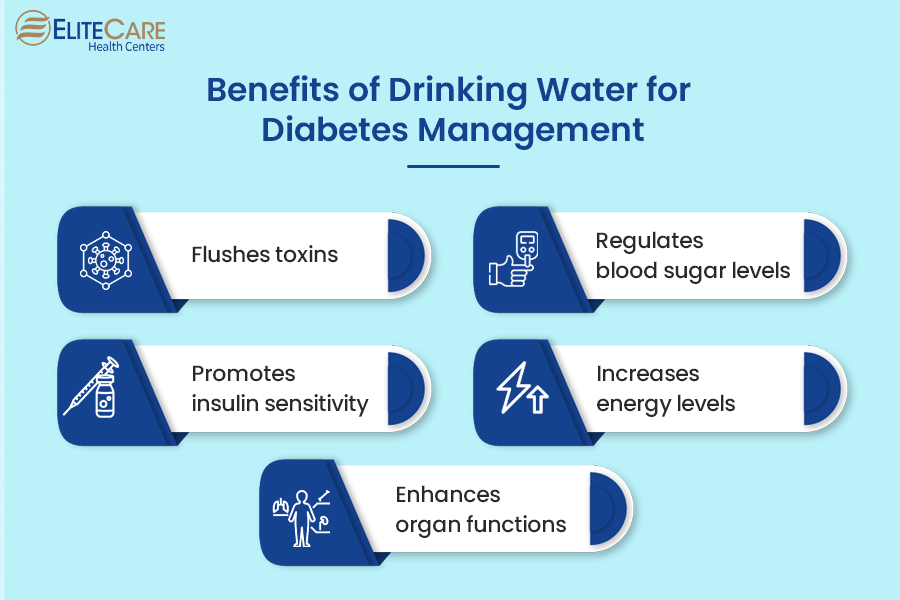
Diabates is a chronic health condition characterized by elevated blood sugar levels in the body. It is particularly common among seniors in the US with about 25% of older adults aged 65 or above suffering from it*. In the upcoming years, this number is expected to increase because of the aging population and the growing number of people with risk factors like obesity or physical inactivity.
Managing diabetes is crucial, especially for seniors. because it can lead to serious complications such as damaged nerves, heart disease, kidney damage, vision impairment, and more. While there are several steps one may take to maintain blood glucose levels, recent studies have revealed that drinking adequate water can also help. But are water and diabetes management interlinked and how does water help diabetes? Read on to find out.
Benefits of Drinking Water for Diabetes Management

1. Flushes Toxins
Water helps flush out impurities and toxins from the body, which can interfere with the body’s ability to properly metabolize and utilize glucose for energy. Therefore, it can reduce the risk of hyperglycemia, a potentially dangerous condition associated with diabetes.
Toxins can accumulate in the body over time, causing inflammation, oxidative stress, and other harmful effects. By drinking enough water, seniors suffering from diabetes can support their kidneys and liver health.
2. Regulates Blood Sugar Levels
When the body is dehydrated, it becomes more difficult to metabolize glucose, leading to higher blood sugar levels. Researchers have revealed that drinking water can help lower blood sugar levels in both type 1 and type 2 diabetes.
Recent studies have stated that drinking 500 ml of water after a meal may help reduce the rise of blood glucose levels post-meal.
3. Increases Energy Levels
Drinking the right amount of water can also help reduce fatigue which is a common symptom of diabetes. A study conducted by the University of Connecticut found that dehydration can cause severe weakness, and difficulty concentrating which is often a common problem among seniors. By drinking water, seniors with diabetes can counteract these effects and feel more energized.
4. Promotes Insulin Sensitivity
Adequate hydration can increase insulin sensitivity, which is the body’s ability to respond to insulin and regulate blood sugar levels. Insulin is a hormone produced by the pancreas, helping the body use glucose, or sugar, from carbohydrates in the foods we eat.
Increasing insulin sensitivity is particularly important for seniors with type 2 diabetes, as insulin resistance is a common feature of this condition.
5. Enhances Organ Functions
The most seen long-term side effect of diabetes is organ dysfunction. Over time, high glucose levels in the body can damage several organs like kidney, liver, pancreas, etc. Drinking adequate amounts of water is essential for maintaining optimal organ function in seniors with diabetes.
Recommended Water Intake for Seniors
The recommended water intake for seniors for better diabetes management is not significantly different from the general guideline for regular water intake. Seniors should drink at least 8 cups or 64 ounces of water per day to stay adequately hydrated.
However, some experts suggest that seniors with diabetes may benefit from drinking even more water. But it is wise to consult a healthcare provider or a registered dietitian for personalized recommendations based on specific health conditions and needs.
4 Strategies to Help Seniors Drink Adequate Water
1. Set a daily goal
This daily goal can be the minimum recommended amount of 8 cups (64 ounces) per day or an individualized amount based on their specific needs. Keep track of their water intake throughout the day to monitor their progress more effectively and adjust if required.
2. Make it accessible
One of the crucial steps for adequate hydration is to make water accessible to seniors, especially those with mobility issues. It means keeping a water bottle, glasses and straws nearby or installing a water dispenser within arm’s reach.
3. Flavor it up
For seniors who are less likely to have plain water, adding natural flavors can make the drink more appealing. Infuse water with a slice of lemon, a few mint leaves, herbs, or spices can add flavors to their drink. Additionally, caregivers can also incorporate fruits like watermelon, herbal beverages like chamomile tea, or soups into their diet for better hydration.
Avoid flavored water with added sweeteners or synthetic flavors, as these can negatively impact blood sugar levels for those with diabetes.
4. Use reminders
Seniors who may forget to drink enough water throughout the day, reminders can work as a helpful tool. Use alarms, sticky notes in visible places, etc. as a reminder. These reminders can help seniors stay on track and achieve their daily water intake goal.
Conclusion
Drinking water, however, is just a part of preventive care and not a substitute for medication or other lifestyle changes required for managing diabetes. Therefore, keep up with a healthy diet, exercise regularly, avoid sugary foods and beverages, and follow prescribed medications to manage diabetes effectively. Additionally, do not skip regular check-ups and screenings. To manage diabetes efficiently, seniors can consult the top board-certified primary care physicians at one of the top Florida medical clinics, EliteCare Health Center. Contact us or visit the nearest center to schedule an appointment with us.
*Data retrieved from the Centers for Disease Control and Prevention on the severity of diabetes among US seniors






